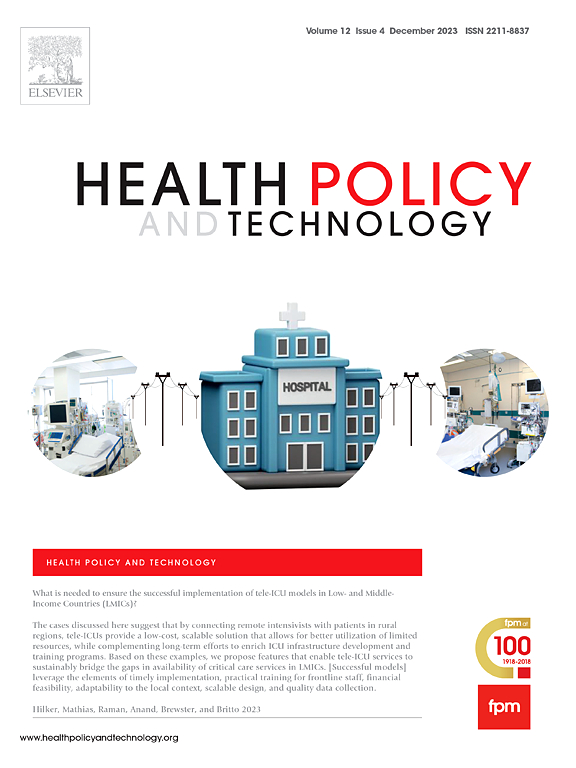中国老年人互联网使用与总体医疗服务满意度:基于倾向得分匹配的反事实估计
IF 3.7
3区 医学
Q1 HEALTH POLICY & SERVICES
引用次数: 0
摘要
目的在中国“互联网+医疗”改革的背景下,检验互联网的使用是否提高了老年人对整体医疗服务(SMS)的满意度,并分析改革在老年人群中的有效性。方法基于2020年中国家庭面板研究(China Family Panel Studies)的横断面数据,采用倾向得分匹配(PSM)模型检验中国60岁及以上老年人网络使用与短信的关系(4661份观察),并采用普通最小二乘法(OLS)回归模型探讨自评健康(SH)在这一关系中的中介作用。结果在中国,互联网的使用与老年人短信的减少有关,互联网用户的短信比非互联网用户少18%左右。然而,我们发现没有证据表明SH在互联网使用和短信之间起到中介作用,这与我们的预期相反。结论互联网的使用导致中国老年人短信的使用水平降低。未来,政府需要进一步推动“互联网+医疗”改革的成果,让老年人更公平地受益,最终改善他们的短信服务。本研究表明,互联网的使用导致中国老年人对整体医疗服务(SMS)的满意度下降。这一结果可以帮助决策者更好地了解医疗改革的成果,以及如何进一步扩大卫生治理的有效性。本文章由计算机程序翻译,如有差异,请以英文原文为准。
Internet use and satisfaction with overall medical services among older adults in China: Counterfactual estimation based on propensity score matching
Objectives
In the context of China's "Internet Plus Healthcare" reform, this study aims to test whether the use of the Internet has improved older adults’ satisfaction with overall medical services (SMS), and analyze the effectiveness of the reform in the older population.
Methods
Based on the cross-sectional data from the China Family Panel Studies in 2020, propensity score matching (PSM) models were employed to examine the relationship between Internet use and SMS of Chinese older adults (4661 observations aged 60 and above), and ordinary least square (OLS) regression models were adopted to explore the mediating role of self-rated health (SH) in this relationship.
Results
Internet use was associated with a decline in SMS among older adults in China, with Internet users’ SMS being about 18 % lower than non-users. However, we found no evidence for SH mediating the relationship between Internet use and SMS, which is contrary to our expectation.
Conclusions
Internet use has led to lower levels of SMS among Chinese older adults. In the future, the government needs to further promote the achievements of the “Internet Plus Healthcare” reform to benefit senior citizens more equitably and ultimately improve their SMS.
Public interest summary
This research showed that Internet use has led to a decrease in satisfaction with overall medical services (SMS) among older adults in China. This result could assist decision-makers in better understanding the healthcare reform achievement and how to further expand the effectiveness of health governance.
求助全文
通过发布文献求助,成功后即可免费获取论文全文。
去求助
来源期刊

Health Policy and Technology
Medicine-Health Policy
CiteScore
9.20
自引率
3.30%
发文量
78
审稿时长
88 days
期刊介绍:
Health Policy and Technology (HPT), is the official journal of the Fellowship of Postgraduate Medicine (FPM), a cross-disciplinary journal, which focuses on past, present and future health policy and the role of technology in clinical and non-clinical national and international health environments.
HPT provides a further excellent way for the FPM to continue to make important national and international contributions to development of policy and practice within medicine and related disciplines. The aim of HPT is to publish relevant, timely and accessible articles and commentaries to support policy-makers, health professionals, health technology providers, patient groups and academia interested in health policy and technology.
Topics covered by HPT will include:
- Health technology, including drug discovery, diagnostics, medicines, devices, therapeutic delivery and eHealth systems
- Cross-national comparisons on health policy using evidence-based approaches
- National studies on health policy to determine the outcomes of technology-driven initiatives
- Cross-border eHealth including health tourism
- The digital divide in mobility, access and affordability of healthcare
- Health technology assessment (HTA) methods and tools for evaluating the effectiveness of clinical and non-clinical health technologies
- Health and eHealth indicators and benchmarks (measure/metrics) for understanding the adoption and diffusion of health technologies
- Health and eHealth models and frameworks to support policy-makers and other stakeholders in decision-making
- Stakeholder engagement with health technologies (clinical and patient/citizen buy-in)
- Regulation and health economics
 求助内容:
求助内容: 应助结果提醒方式:
应助结果提醒方式:


